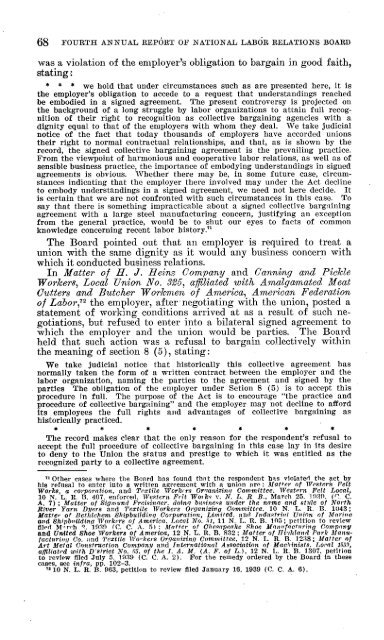J. - National Labor Relations Board
J. - National Labor Relations Board
J. - National Labor Relations Board
- No tags were found...
You also want an ePaper? Increase the reach of your titles
YUMPU automatically turns print PDFs into web optimized ePapers that Google loves.
68 FOURTH ANNUAL REPORT OF NATIONAL LABOR RELATIONS BOARDwas a violation of the employer's obligation to bargain in good faith,stating:* * * we hold that under circumstances such as are presented here, it isthe employer's obligation to accede to a request that understandings reachedbe embodied in a signed agreement. The present controversy is projected onthe background of a long struggle by labor organizations to attain full recognitionof their right to recognition as collective bargaining agencies with adignity equal to that of the employers with whom they deal. We take judicialnotice of the fact that today thousands of employers have accorded unionstheir right to normal contractual relationships, and that, as is shown by therecord, the signed collective bargaining agreement is the prevailing practice.From the viewpoint of harmonious and cooperative labor relations, as well as ofsensible business practice, the importance of embodying understandings in signedagreements is obvious. Whether there may be, in some future case, circumstancesindicating that the employer there involved may under the Act declineto embody understandings in a signed agreement, we need not here decide. Itis certain that we are not confronted with such circumstances in this case. Tosay that there is something impracticable about a signed collective bargainingagreement with a large steel manufacturing concern, justifying an exceptionfrom the general practice, would be to shut our eyes to facts of commonknowledge concerning recent labor history.'The <strong>Board</strong> pointed out that an employer is required to treat aunion with the same dignity as it would any business concern withwhich it conducted business relations.In Matter of H. J. Heinz Company and Canning and PickleWorkers, Local Union No. 305, affiliated with Amalgamated MeatCutters and Butcher Workmen of America, American Federationof <strong>Labor</strong>," the employer, after negotiating with the union, posted astatement of working conditions arrived at as a result of such negotiations,but refused to enter into a bilateral signed agreement towhich the employer and the union would be parties. The <strong>Board</strong>held that such action was a refusal to bargain collectively withinthe meaning of section 8 (5), stating:We take judicial notice that historically this collective agreement hasnormally taken the form of a written contract between the employer and thelabor organization, naming the parties to the agreement and signed by theparties The obligation of the employer under Setion 8 (5) is to accept thisprocedure in full. The purpose of the Act is to encourage "the practice andprocedure of collective bargaining" and the employer may not decline to affordIts employees the full rights and advantages of collective bargaining ashistorically practiced.The record makes clear that the only reason for the respondent's refusal toaccept the full procedure of collective bargaining in this case lay in its desireto deny to the Union the status and prestige to which it was entitled as therecognized party to a collective agreement.71 0ther cases where the <strong>Board</strong> has found that the respondent has violated the act byhis refusal to enter into a written agreement with a union era : Matter of Western FeltWorks, a corporation, and Textile Workirs Organizin g Committee. Western Felt Local,10 N. L. R. B. 407. enforced. Western Felt Woi k •? v. N. L. R B., March 25. 1939. ( 0 C.A. 7); Matter of Sigmund Freisin ger. doing business under the name and st yle of NorthRiver Yarn Dyers and Textile Workers Organizing Committee. 10 N. L. R. B. 1043;Matter of Bethlehem. Shipbuilding Corporation, Limited, and Industrial Union of Marineand Shipbuilding Workers of America. Local No. 51, 11 N. L. R. B. 105;• petition to reviewfiled 111 , rch 9 . 1929 (C. C. A. 51: Matter of Chesapeake Shoe Manufacturing Companyand United Shoe Workers of America, 12 N. L. R. B. 832; Matter of Hi ghland Park ManufacturingCo. and Textile Wo , liers Organizing Committee. 12 N. L. R. B. 1238; Matter ofArt Metal Construction Company and International Association of Machinists. Loral 1559,affiliated with D'striet No. 65, of the I. A. M. (A. F. of L.), 12 N. L. R. B. 1307, petitionto review filed July 5. 1939 (C. C. A. 2). For the remedy ordered by the <strong>Board</strong> in thesecases, see infra, pp. 102-3.72 10 N. L. R. B. 963, petition to review filed January 16, 1939 (C. C. A. 6).
















